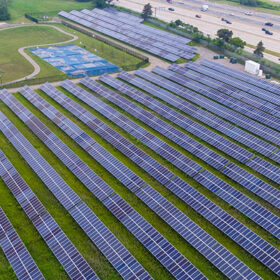With Deloitte forecasting the global clean hydrogen development market to hit $642 billion by 2030 and ballooning to $1.4 trillion by 2050, growth in the industry will require significant amounts of private capital investment and government stimulus packages.
As part of President Joe Biden’s Investing in America agenda, the U.S. Department of Energy (DOE) today released a notice of intent (NOI), which includes a request for information (RFI) to invest up to $1 billion in a demand-side initiative to support Regional Clean Hydrogen Hubs (H2Hubs).
Later this year, the Biden-Harris Administration will announce the selection of six to 10 H2Hubs projects for a total funding of up to $7 billion in federal funding—one of the most historic clean energy investments in history and a cornerstone of President Biden’s vision to achieve carbon-free grid by 2035 and net-zero emissions by 2050.
With funding from the 2021 Bipartisan Infrastructure Law, the H2Hubs program will help form the foundation of a U.S. clean hydrogen network vital to reducing emissions from some of the most energy-intensive sectors of our economy, including transportation, industrial and chemical processes.
The announcement will help ensure both producers and end users in clean hydrogen have the market certainty they need to unlock private investment and realize the full potential of clean hydrogen. Achieving commercial-scale clean hydrogen deployment is critical to creating new clean energy jobs and economic opportunities in communities across the U.S. while enabling long-term decarbonization objectives.
“Ensuring America is the global leader in the next generation of clean energy technologies requires all of us — government and industry — coming together to confront shared challenges, particularly lack of market certainty for clean hydrogen that too often delays progress,” said U.S. Secretary of Energy Jennifer M. Granholm. “That’s why DOE is setting up a new initiative to help our private sector partners address bottlenecks and other project impediments — helping industry unlock the full potential of this incredibly versatile energy resource and supporting the long-term success of the H2hubs.”
According to DOE’s Pathways to Commercial Liftoff: Clean Hydrogen report, the U.S. hydrogen economy has the potential to add 100,000 new direct and indirect jobs by 2030. Clean hydrogen will strengthen American energy independence and accelerate a manufacturing boom that has already created over 800,000 jobs since President Biden took office in 2021.
The H2Hubs initiative provides revenue certainty that hydrogen producers require to attract private sector investment. It will also help meet the needs of end users who often prefer the flexibility to purchase hydrogen on shorter-term contracts and require confidence in the long-term availability of clean hydrogen before making critical, long-term investments.
The NOI seeks public input on the potential benefits and risks, operating models, governance structures, and equipped implementing partners. The notice is informed by DOE’s dialogue with the energy industry, investment firms, nonprofit groups, non-governmental organizations, and public response from the demand-side request for information issued in spring 2022, and from the recent Pathways report.
Funded by the Bipartisan Infrastructure Law and managed by DOE’s Office of Clean Energy Demonstrations with support from the Office of Energy Efficiency and Renewable Energy, H2Hubs are a critical component of the Biden-Harris Administration’s commitment to invest in America’s workforce, jumpstart local economic growth, and create jobs while strengthening the role of the U.S. in the energy transition.
The proposed mechanism outlined in the NOI will help connect the H2Hubs to prospective purchasers — providing durable demand and sufficient customers for the Hubs while also supporting President Biden’s whole-of-government approach to building a strong clean hydrogen economy.
Read the full Notice of Intent and Request for Information here.
This content is protected by copyright and may not be reused. If you want to cooperate with us and would like to reuse some of our content, please contact: editors@pv-magazine.com.








It will be interesting to follow energy efficency for harvesting hydrogen from water using electroliss.
I also want to fallow the cost of fuel cells that are used for conversion of hydrogent to elcrtical current and transporation.
I am hoping the US Legislature will go forward with the Hydrogen Highway Infrastructure. Lithium battery vehicles are much more dirty and poisonous than hydrogen.
Our government must subsidize the use of hydrogen vehicles and hydrogen fuel and not just subsidize the sellers of the vehicles and fuels. Make hydrogen available for everyone, not just the rich.
We need to have cheap hydrogen available for vehicles and home energy needs. Ask the American Hydrogen Association how.
Don’t enable the greedier businesses to bamboozle you into impractical ways to reform other fuels to obtain hydrogen. Just split H2O with solar energy or geothermal energy and step away from chemical companies. ASK Plug Power what to do and they will explain it.